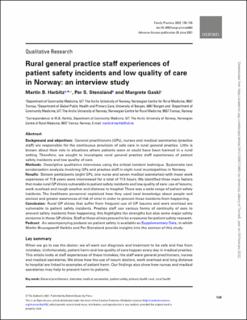Rural general practice staff experiences of patient safety incidents and low quality of care in Norway: an interview study
Journal article, Peer reviewed
Published version

Åpne
Permanent lenke
https://hdl.handle.net/11250/2992114Utgivelsesdato
2022Metadata
Vis full innførselSamlinger
Sammendrag
Background and objectives
General practitioners (GPs), nurses and medical secretaries (practice staff) are responsible for the continuous provision of safe care in rural general practice. Little is known about their role in situations where patients were or could have been harmed in a rural setting. Therefore, we sought to investigate rural general practice staff experiences of patient safety incidents and low quality of care.
Methods
Descriptive qualitative interviews using the critical incident technique. Systematic text condensation analysis involving GPs and practice staff in eight rural municipalities in Norway.
Results
Sixteen participants (eight GPs, one nurse and seven medical secretaries) with mean work experience of 11.8 years were interviewed for a total of 11.5 hours. We identified three main factors that make rural GP clinics vulnerable to patient safety incidents and low quality of care: use of locums, work overload and rough weather and distance to hospital. There was a wide range of patient safety incidents. The healthcare personnel explained how they used local knowledge about people and context and greater awareness of risk of error in order to prevent these incidents from happening.
Conclusion
Rural GP clinics that suffer from frequent use of GP locums and work overload are vulnerable to patient safety incidents. Practice staff use various forms of continuity of care to prevent safety incidents from happening; this highlights the strengths but also some major safety concerns in these GP clinics. Staff at these clinics proved to be a resource for patient safety research.
Podcast
An accompanying podcast on patient safety is available as Supplementary Data, in which Martin Bruusgaardf Harbitz and Per Stensland provide insights into the context of this study.
